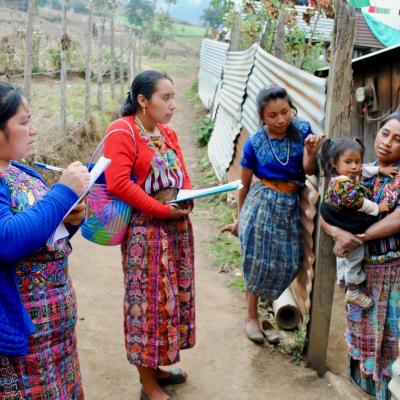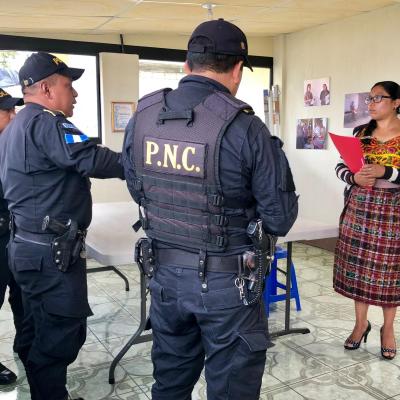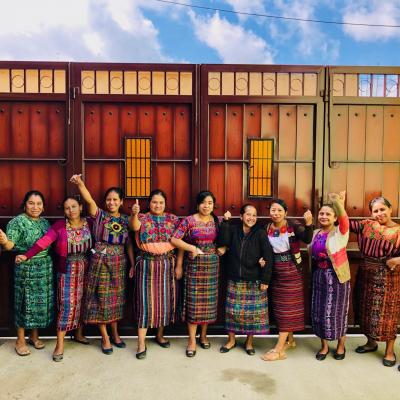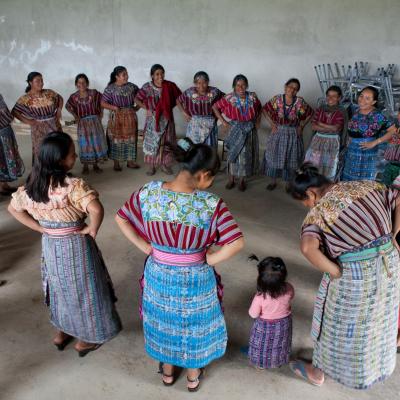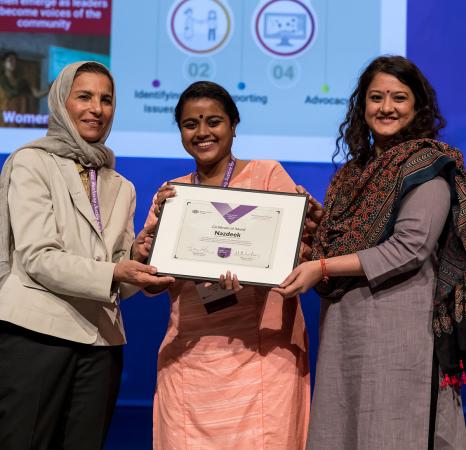Project Pitch and Q&A
Watch Women's Justice Initiative's World Justice Challenge project pitch and join WJP's World Justice Challenge 2021 Community Forum to ask questions to project representatives, explore additional resources, meet new colleagues, and more. Join the discussion and help us build stronger rule of law values, institutions, and communities around the world.
Ask your question at the Community Forum
Project Summary
The Women's Justice Initiative (WJI) works to prevent gender-based violence and improve the lives of indigenous Guatemalan women and girls through education, access to legal services, and by strengthening public institutions. This project addresses the gaps in services for survivors of violence in rural communities through a community-based, holistic legal empowerment approach, combining rights education with accessible legal services and justice system capacity building. By working at the individual, community, and municipal levels, WJI changes social norms that condone violence against women, increases access to justice for Maya women and girls, and protects fundamental human rights in rural Guatemala.
Problem Statement
Violence against women and girls (VAWG) is considered normal and acceptable in rural Guatemala. The government estimates that over one third of indigenous women who live with a man experience violence. VAWG stands as a fundamental barrier to equal participation of women and men in social, economic, and political spheres. Rural, indigenous women and girls, especially survivors of violence, face linguistic, financial, and geographic barriers to accessing justice. In the communities where WJI works, poor educational opportunities and harmful gender norms—such as early unions and child marriage—leave indigenous women vulnerable to violence and with a weak understanding of the law and their rights. There are no civil society organizations working to protect indigenous women's rights in these communities. In the municipality of Tecpán, 92% of the population is indigenous and 70% live in poverty—16% in extreme poverty. Prior to WJI, only 4% of program participants had ever received legal services, and 82% had not known where they could seek help if they suffered from violence.
The COVID-19 pandemic and the resulting lockdowns, court closures, and restrictions on mobility have led to both increases in VAWG and further reductions in available services. Seventy-seven percent of WJI's legal clients since March 2020 have experienced violence. Many are also out of work and in need of child support for the first time. WJI is helping some clients navigate a backlogged legal system, while others choose to remain in lockdown with abusive partners rather than face the economic uncertainty of separating. Low cell phone and internet access in rural communities has made it extremely challenging for women to report violence. WJI has adapted to the realities of COVID-19 in order to continue working to prevent VAWG, provide services to survivors of violence, and build the capacity of the justice system.
Project Description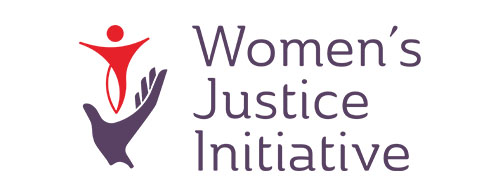
WJI sought to address the gaps in services and improve access to justice for indigenous women in the municipality of Tecpán through legal literacy education, accessible legal services, and accompaniment of survivors of violence. The project also aimed to increase the capacity of the justice system by improving the ability of key public actors to serve rural Maya survivors of violence.
WJI implemented a five-month legal literacy course through which women gained an understanding of their rights and developed the communication and leadership skills necessary to assert those rights. 573 women have graduated and 150 women recently began the course. WJI also trained 26 women to become Community Advocates through an intensive, 18-month human rights and leadership course. Advocates improve access to justice by providing talks on VAWG in their communities, referring and accompanying women to WJI for legal services, and collaborating with community leaders to develop and implement plans for preventing and responding to VAWG. They serve as a local resource for women and girls, multiplying and sustaining WJI's impact.
To date, WJI has provided legal services to 213 women in Tecpán, including services for survivors of violence and civil legal support to secure women's economic rights through property titling, land disputes, alimony, and child support cases. By providing mobile legal outreach to rural areas in Kaqchikel, the local Mayan language, WJI has improved access to justice for the most vulnerable women who cannot leave their communities.
WJI provided VAWG sensitivity training to 33 municipal service providers and police officers, strengthening their ability to respond to VAWG. WJI also trained 54 community leaders and helped them develop community-based referral systems and protocols for responding to VAWG. Within one year, service providers, police, and community leaders referred 88 women to WJI for legal services. An additional 15 police officers will receive VAWG sensitivity training this year.
At the onset of COVID-19, WJI worked with Community Advocates to identify emerging needs in partner communities. In response to increasing VAWG and restricted services, WJI created a hotline for survivors of violence, providing legal and psychological counseling over the phone. WJI also collaborated with local organizations to create informative radio spots in local Mayan languages throughout Guatemala, sharing WJI's hotline number with over 100,000 people. Although WJI has since been able to resume in-person programming with COVID-19 precautions, its hotline remains active and continues to improve access to justice for rural, indigenous women.
Project Impact and Potential for Scaling, Replication, and Sustainability
To date, WJI has served more than 35,600 Maya Kaqchikel women. Nonetheless, nearly 50% of Guatemala's population is indigenous Maya, including over one million people who identify as ethnically Kaqchikel. VAWG remains pervasive and accepted throughout Guatemala. Through partnerships in at least 10 municipalities, WJI aims to scale to directly serve more than 100,000 Maya women over the next five years. In preparation, WJI has begun testing its methodology with different Maya populations, including the K’iche, Q’eqchi, and Mam.
WJI has also begun testing an adapted, more scalable version of this project in San Juan Comalapa, a primarily Kaqchikel municipality. WJI is training Community Advocates to implement the legal literacy course, reducing the need for staff to travel and thus allowing WJI to work in more communities simultaneously. To ensure that Advocates can teach this course, WJI has simplified the curriculum and will provide increased training on workshop facilitation. Additionally, WJI plans to experiment with new methods for engaging community leaders and service providers in order to evaluate how to make this work more sustainable and scalable.
WJI has also adapted its plans to ensure scalability despite the challenges of COVID-19. WJI continues to expand its remote programming, including by conducting legal consultations via videoconferencing on tablets and strengthening WJI's hotline for survivors of violence. WJI will begin developing new radio programming to complement the women's legal literacy workshops and to promote healthy relationships and communication within families. These programs will help shift attitudes and improve the scalability of the legal literacy course. WJI will also continue to support Community Advocates as points of contact in former project communities, and Advocates will continue to assist their peers in receiving legal services from WJI. WJI plans to devote additional resources to strengthening the Community Advocates' network to ensure the sustainability of their work.
WJI's community-based methodology has been proven effective for sustainably reducing VAWG and expanding access to justice. WJI focuses on the root causes of VAWG, including gender inequality and harmful social norms, and ensures that women and girls are able to exercise their right to live free from violence through access to services, increased legal literacy, and changes in community attitudes. WJI also protects women's rights by developing the capacities of justice system actors to properly implement policies related to VAWG. WJI will continue expanding its proven programs in response to the tremendous need in rural Guatemala.
Featured Resources
- United Nations Trust Fund External Evaluation (PDF - Spanish)
- WomenStrong International Remote Programming Guide (PDF)
Key Project Links
Social Media: Facebook, Twitter, Youtube, Instagram
Website: womens-justice.org
Submit Your Questions and Get Ready to Pick a Winner!
Representatives of World Justice Challenge 2021 finalist projects are on hand to answer your questions. Join our online Community Forum to engage with finalists, share resources, and network with other members of the rule of law community. Submit your questions now and get ready to vote for your favorite project—voting opens in mid-April!
Join the Conversation
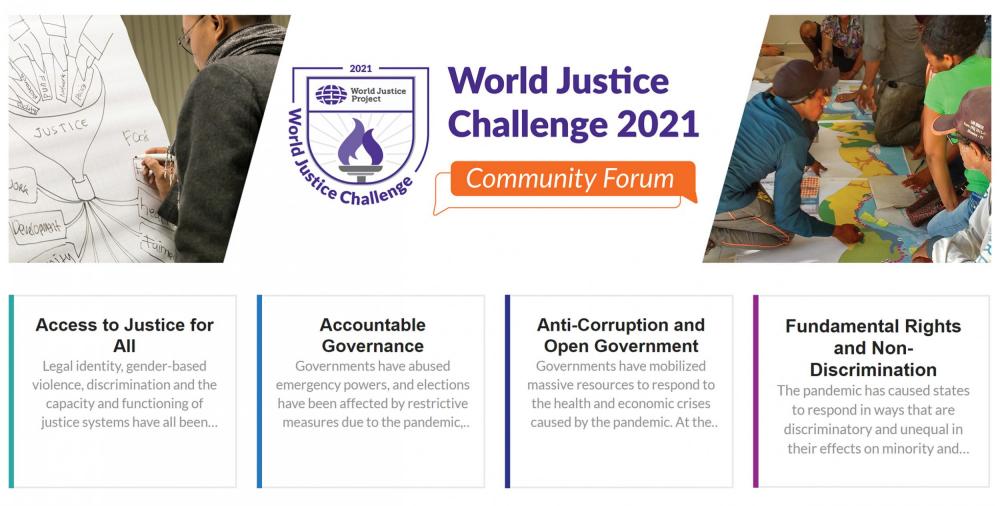
Program Photos
(Click to expand)
